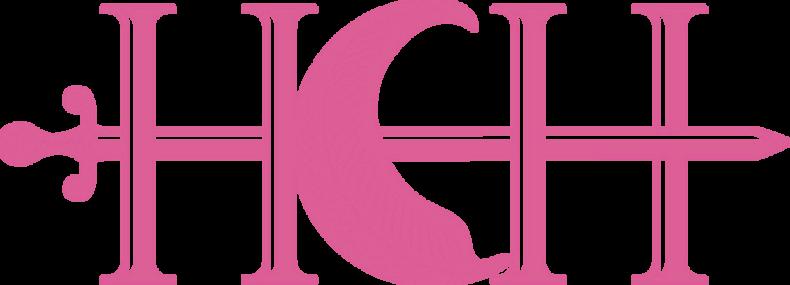

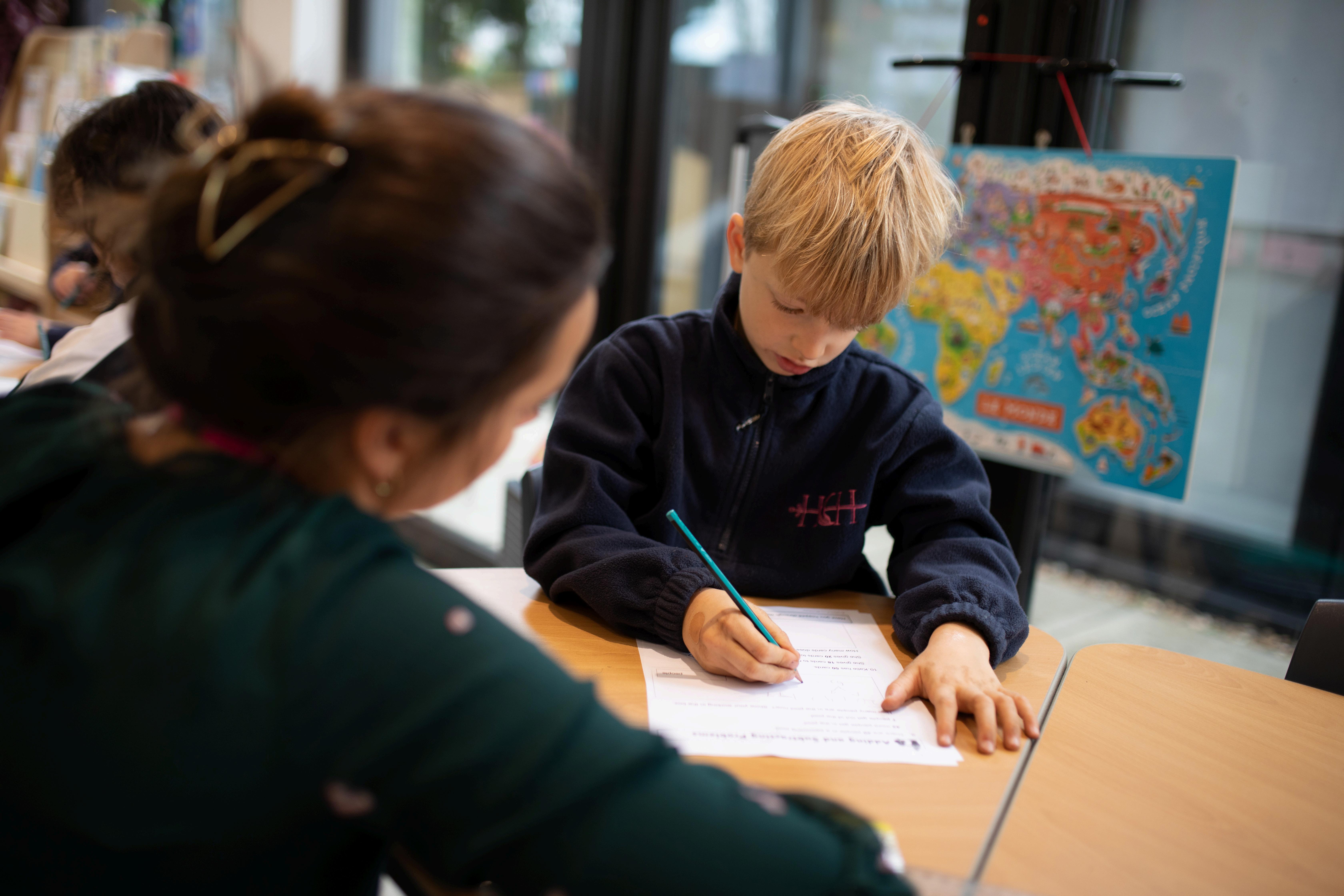










Hampton Court House Prep is about providing an educational experience centred around the child with bespoke approaches for every individual. Whether in classroom settings, extra-curricular activities or charity work, we teach the children to be well-rounded and caring and to contribute to all aspects of school life. Our day-to-day curriculum is one of the foundations of this approach. Lessons are designed to be interesting, engaging, supportive and challenging so that all children feel able to do their best. Teachers will always enable children to contribute fully to lessons, learn and demonstrate new knowledge, skills and ideas, and to shape their voice as part of a dynamic, but homely, community.
At Hampton Court House, our Years 1 – 6 curriculum is designed with the holistic development of each child in mind. We aim to cultivate a love for learning, curiosity, and confidence in our students. Central to our intent is the bilingual program for Years 1 – 4, where approximately 50% of the curriculum is delivered in French. This unique approach not only enhances language skills but also broadens cultural understanding and cognitive flexibility. Our goal is to support every child’s intellectual, social, and emotional growth through a rich and balanced curriculum where mistakes are accepted, and questions welcomed.
Our curriculum is implemented with a focus on creating an inclusive, engaging, and supportive learning environment with a sense of fun. For Years 1 – 4, the bilingual program integrates French into everyday learning, covering subjects such as humanities, science, sport and the arts in both English and French. This immersive approach helps students develop proficiency in both languages naturally and enjoyably, with in class support used to ensure all children are able to understand and access the curriculum. Lessons are structured to build on previous knowledge, ensuring a smooth progression. Within years 5 and 6 more specialist teachers are used to deliver the curriculum which allows for the development of skills necessary to start their secondary education in year 7. We employ a variety of teaching methods, including individual tasks, group work, and hands-on activities, to cater to different learning styles. Continuous assessment practices allow us to monitor each child's progress closely and provide personalised support as needed.
Impact
The impact of our carefully crafted curriculum is seen in the enthusiasm and active participation of our students. They develop strong foundation skills in literacy, numeracy, and science, along with the ability to think critically and solve problems. The bilingual program enhances their language skills and cultural awareness, giving them a broader perspective and improved cognitive abilities. Our students also grow in confidence, independence, and social skills. Regular assessments demonstrate enhanced academic progress and personal development, ensuring that students are well-prepared for the next stage of their education with a lifelong love of learning and a unique bilingual advantage.
Key contacts
Susie Byers Head of Prep sby@hchnet.co.uk
Eldon Fayers Assistant Principal | Teaching & Learning efa@hchnet.co.uk
Imogen Stone
Prep Head of Teaching & Learning ist@hchnet.co.uk
Nick Edwards Assistant Principal | Data & Assessment ned@hchnet.co.uk
Paul Pearce
Deputy Head | Operations & Academic pgp@hchnet.co.uk
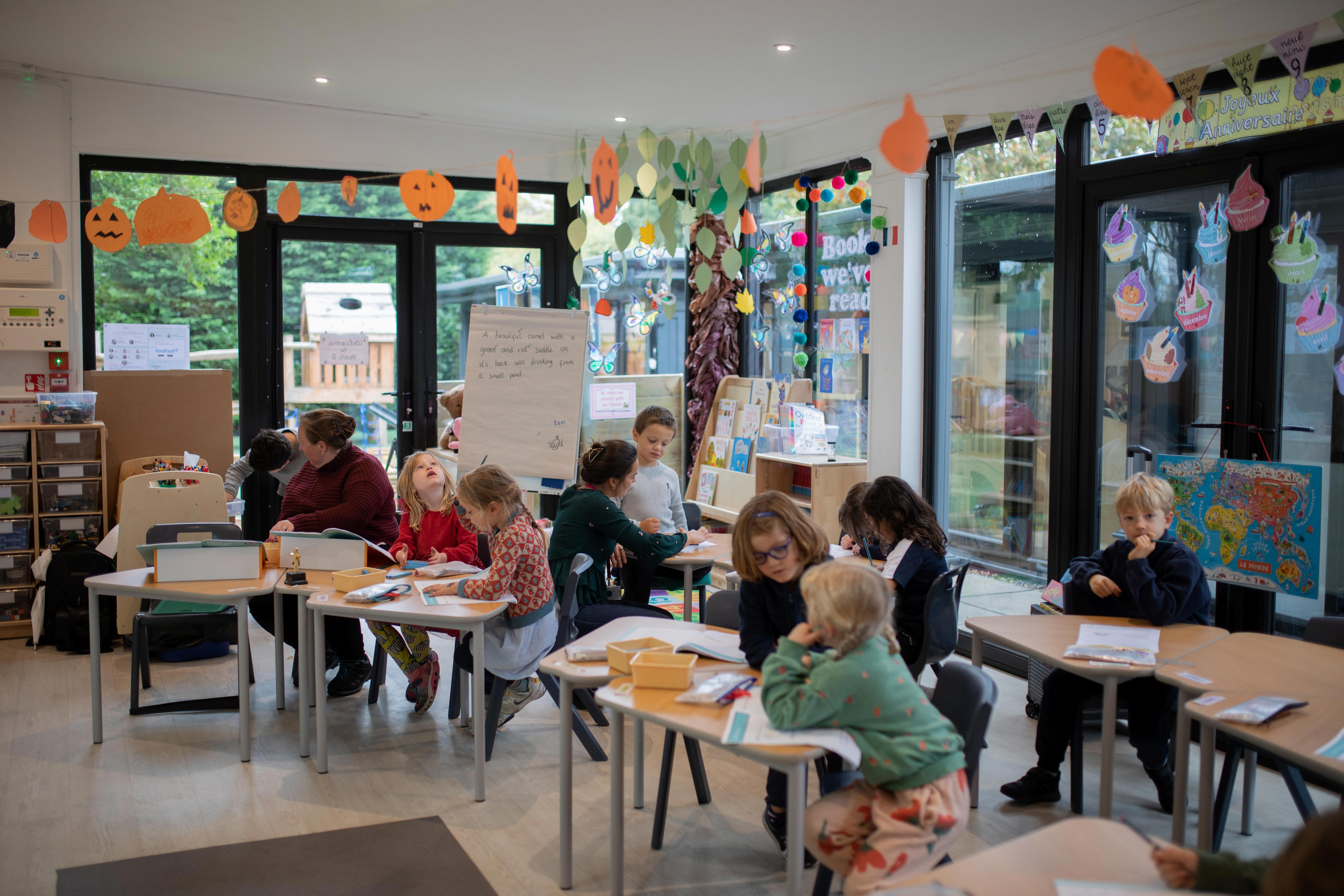

In the first part of the term the children will explore the Solar System Using a variety of different techniques and materials, pupils will create patterned and textured papers with which to represent the planets on an outer space collage. In the second half term, taking inspiration from the work of Clarice Cliff, pupils will learn to master the pinch pot technique to create colourfully decorated pots which will be fired in the kiln.
Term
Autumn 1
Autumn 2
Spring 1
Spring 2
Summer 1
Summer 2
What are we studying?
Art Calendar: Making art inspired by artists Yayoi Kusama, L S Lowry, Henri Matisse, Barbara Hepworth, Eileen Agar
Art calendar: Making art inspired by artists Mary Fedden, David Hockney, Peter Blake, Howard Hodgkin, Andy Goldsworthy
Solar System: Using a variety of different techniques and materials, pupils will create patterned and textured papers with which to represent the planets on an outer space collage
Clay: Taking inspiration from the work of Clarice Cliff, pupils will learn to master the pinch pot technique to create colourfully decorated pots which will be fired in the kiln
Sewing project: Taking inspiration from textile designer Donna Wilson, pupils will design and stitch a hand puppet This project aims to develop fine motor skills and introduces pupils to the properties of fabric and how to master a basic running stitch
Drawing: Studying the work of children’s book illustrators, pupils will learn about storytelling through art Pupils will revisit the techniques they have learnt to date, to develop and improve drawing skills and make art in response to that of illustrators such as John Burningham, Brian Wildsmith, Satoshi Kitamura and John Klassen

DDM is split into discrete subjects in order to cover a wide range of knowledge across humanities and sciences. Whilst it is an interlinked curriculum, we ensure that the essential foundation of knowledge needed for the later years of prep in each subject and senior are covered.
Year 1 will identify and name a variety of common wild and garden plants, including deciduous and evergreen trees. Identify the needs of plants and trees. Experience growing a flower or vegetable! (lifecycle). Make a map of the garden plot, identifying the plants and predicting what they will turn into when they are fully grown. We will also identify and name a variety of everyday materials, including wood, plastic, glass, metal. Compare and group together a variety of everyday materials based on their simple physical properties.
In Year 1 this term, we will learn about events behind living memory that are significant nationally or globally: Women’s Day with Florence Nightingale. This will help us understand how the lives of others in the past have contributed to our present-day advancements and improvements. We will also learn about significant historical events through St Patrick’s day and St George’s day.
We will discover the Earth and its representations (globe, planisphere, maps) by identifying countries on different continents by reading maps and get key information. We will deepen our understanding of the United Kingdom by naming, locate and identify characteristics of the four countries and capital cities of the United Kingdom. We will also discover the culture, flag and capital of Paris, London, Rome, Venice, Egypt, Australia and Brasilia.

Term
Autumn 1
Autumn 2
Spring 1
Spring 2
Summer 1
Summer 2
What are we studying?
Orientate themselves in the school area thanks to photographs, drawings, and maps.
Understand the reasons for extreme climates in cold and hot deserts, (link climates and landscapes).
Understand the days of the week, months, seasons and weather.
Compare Past, Present and Future by considering evolution through lifestyle and education.
Explore how visual representations of places inform our understanding of them - identify a familiar place out of familiar surroundings.
Name the parts of the body and understand their functioning.
Understand and be aware the importance of having good oral hygiene habits, a well-balanced diet and practising regular sporting activities, (take care of one’s own body and treat it with respect).
Discover the Earth and its representations (globe, planisphere, maps).
Discovery of The United Kingdom and its countries.
Identify and name a variety of common wild and garden plants, including deciduous and evergreen trees.
Identifying the plants and predicting what they will turn into when they are fully grown.
Significant historical events, people, and places in their own locality: St Patrick’s day and St George’s day.
Situate countries on a map.
To recognise their flags, to know their capital cities and some important monument/information.
Use the prepositions of space properly.
Compare and group together a variety of everyday materials based on their simple physical properties.
Study historical events that are significant nationally or globally
Describe cities, towns, and villages.
Compare urban and rural spaces by talking about advantage and inconvenient and use basic geographical vocabulary.
Find out about and describe the basic needs of animals, including humans, for survival.
Understand the development of a duckling in an egg and then how a duckling grows into a duck.
Significant historical events, people, and places in their own locality/ globally.
Sustainability with links to exploitation of resources in the beach.
Taking of the environment, recycling, reduce and re-use.
Describe how animals obtain their food from plants and other animals, using the idea of a simple food chain, and identify and name different sources of food.
Be able to categorise specimens according to their features (Herbivore, Omnivore, Carnivore).
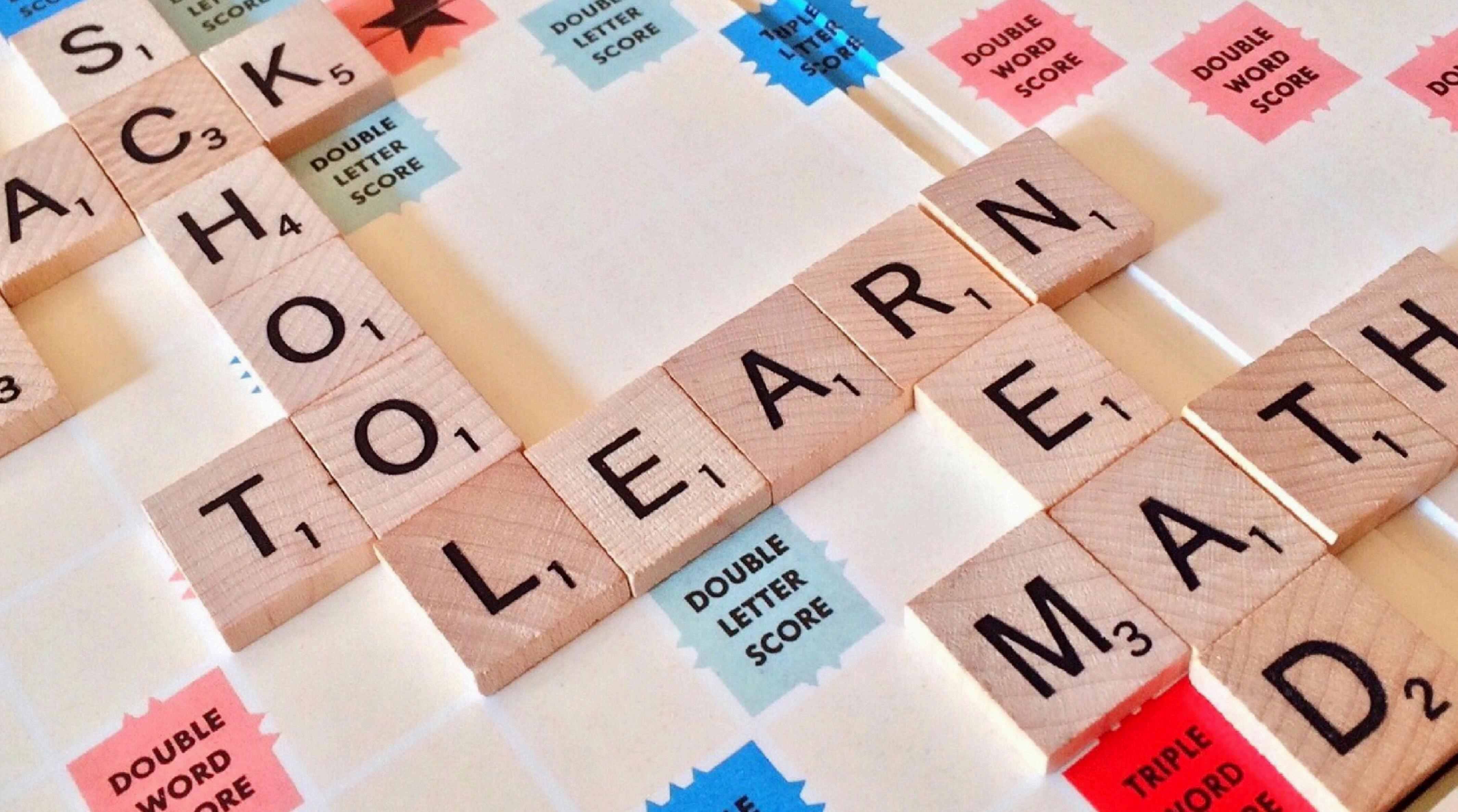

The children will continue to work through the RWI programme in the morning and complete the child focussed and targeted tasks set by each group leader.
In their English lessons, Year one will be looking at Traditional Tales and reading the book, ‘This is the house that Jack built’ by Simms Taback. Year one will then read a range of non-fiction texts about night animals and in the final week of the first half term the children will be reading and enjoying some funny and humorous poetry. After half term, Year one will be looking at the story ‘We’re going on a Lion Hunt’ and look at setting descriptions. Then Year one will be looking at letter writing and we end the Spring Term by reading poems inspired by the five senses by Roger Mcgough.
How it will be assessed
Assessment will be through daily marking and feedback. Through discussion and questioning. At the end of each unit the children will be writing in the style of the author or poet they have been reading. There will also be informal assessment of writing, reading and SPaG at the end of each term.
Term
Autumn 1
Autumn 2
Spring 1
What are we studying?
RWI Phonic Focus
Well being unit – Kites, stars and rockets Y
Spring 2
Summer 1
Summer 2
RWI Phonic Focus
Traditional Tales
Reports and explanations
Humorous poetry
Setting and descriptions
Letter and postcards
Poetry
Stories on a theme
Information Texts
Classic Poetry


The spring term begins with a celebration of National Birdwatching Week, where children learn to identify birds, observe their behaviours, and create feeders to support wildlife.
Throughout the term, children explore the wonders of spring through activities like planting seeds, learning about life cycles, and building bug hotels. They engage in scavenger hunts to observe seasonal changes and practise teamwork through shelter building and campfire cooking.
Creative arts using natural materials, nature-inspired storytelling, and games encourage imagination and a deeper connection to the environment. This term fosters hands-on learning, teamwork, and a lasting appreciation for nature.
Topics and Activities
· Signs of Spring: Discovering and documenting seasonal changes through scavenger hunts, nature walks, and journaling.
· Plant Life Cycles: Planting seeds, investigating plant structures, and learning about the essentials for healthy growth.
· Insect Adventures: Hunting for mini-beasts, understanding their roles in pollination, and designing bug hotels to support local wildlife.
· Animal Life Cycles: Observing frogspawn and exploring butterfly life cycles through crafts and nature-based storytelling
· Shelter Building: Practising bushcraft skills like knot-tying and collaborating to build sturdy dens and shelters.
· Campfire Cooking: Enjoying campfire recipes while storytelling and reflecting on Springtime discoveries.
· Creative Arts: Crafting with natural materials, such as pressed flowers, leaf rubbings, and wildflower arrangements.
· Storytelling and Games: Encouraging imagination and teamwork through nature-inspired games and collaborative tales

Autumn 1
Autumn 2
Spring 1
Spring 2
Summer 1
Summer 2
What are we studying?
Safety in the natural environment and taking safe and supervised risks
Observing the changes in weather and in the natural environment for Autumn and Winter
Celebrate Autumn Harvest and Christmas
Building dens and using tools safely
Celebrate Chinese New Year and harvest from community garden to cook a Chinese meal on the open fire
Celebrate National Birdwatching and make bird feeders for winter birds
Fairytales and stories that link to play in the natural environment
Celebrate National Wildlife Day
Observing new changes in the natural environment coming into Spring and planting
Celebrate World Bee Day
Minibeasts, map making and treasure seeking

The pupils will experience the early stages of expertise in a new language through French listening, reading, speaking and writing. Learning will be both crafted around step-by-step skill development as well as an overall immersive environment that fosters fluid and useful expression in a second language.
They will develop pleasure in reading and understanding by learning how to read and discover new sounds [s], [l], [p], [m], [n], [f] using the Alpha's method. They will apply phonic knowledge and skills as the route to decoding syllables and simple words. During the lesson, the pupils will learn vocabulary about family, pets/animals, house, the body parts and clothes. They will also discover feminine and masculine nouns.
Year 1 will also develop their cultural knowledge by listening to French stories. Finally, they will hear and watch different authentic audios, videos and sing songs.
Term
Autumn 1
Autumn 2
Spring 1
Spring 2
Summer 1
Summer 2
What are we studying?
We will discover the following new sounds [a], [e], [i]. We will learn vocabulary about themselves, politeness, instructions, stationery. We will also develop their cultural knowledge by learning about Loup, listening to French stories.
We will discover the following new sounds [o], [u], [ê]. We will learn vocabulary about numbers from 1 to 20, colours, weather, daily routine. We will also develop their cultural knowledge by learning about Loup, listening to French stories.
We will discover the following new sounds [s], [l], [p]. We will learn vocabulary about family, pets/animals, house. They will also discover feminine and masculine nouns. We will also develop their cultural knowledge by learning about Loup, listening to French stories.
We will discover the following new sounds [m], [n], [f]. We will learn vocabulary about the body parts, clothes. We will also develop their cultural knowledge by learning about Loup, listening to French stories.
We will discover the following new sounds [ch], [v], [r]. We will learn vocabulary about emotions, feelings, sickness. They will discover the singular and plural. We will also develop their cultural knowledge by learning about Loup, listening to French stories.
We will discover the following new sounds [b], [t], [j]. We will learn vocabulary about food, drinks, order in a restaurant and breakfast. We will also develop their cultural knowledge by learning about Loup, listening to French stories.

In Spring term, Year 1 will explore a variety of traditions and celebrations that are integral to French life. We will begin by learning about la galette des rois, a traditional pastry enjoyed during Epiphany, and explore the lively carnivals of Nice and Dunkerque, famous for their vibrant parades and festivities. Valentine's Day in France will also be discussed, highlighting its romantic traditions, alongside the popular Journée de la Crêpe, or Pancake Day, where French people indulge in delicious crêpes.
In the second part of the term, students will focus on Édith Piaf during International Women's Week, delving into her music and legacy. As spring approaches, we will discover the various spring celebrations, including the beautiful flower festivals and the International Kite Festival in Berck-sur-Mer. The term will conclude with a study of le poisson d’avril, France’s version of April Fools’ Day, and the country’s Easter traditions, offering insights into French customs surrounding these holidays.
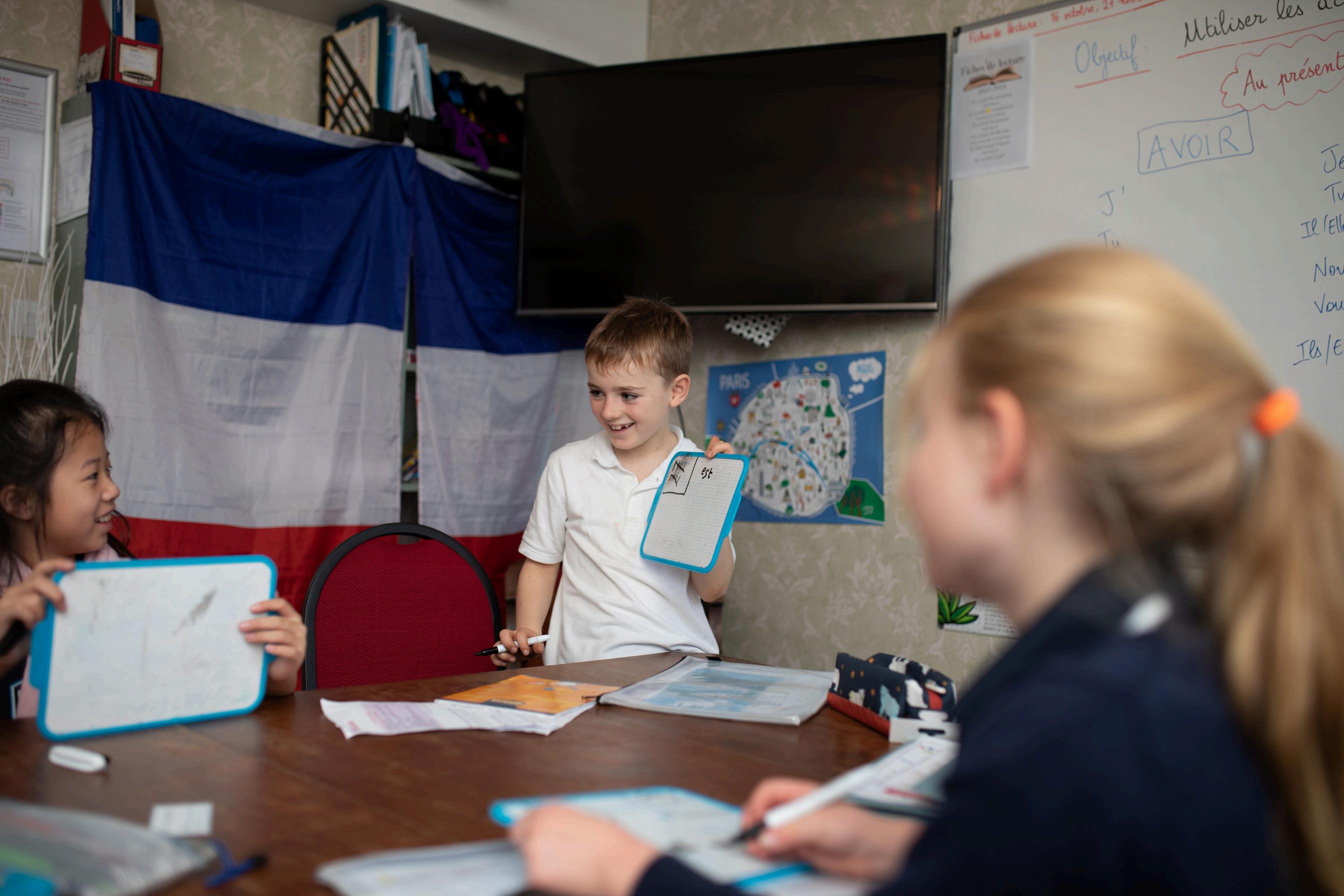


The Spring term will consist of 3 main topics in Maths; Place Value, Addition and Subtraction, and Measure.
Developing Place Value
Understanding the numbers on the number line to 20
Estimating, ordering, and comparing numbers to 20
Extending the number line to 50
Estimating, ordering, and comparing numbers to 50
Addition and Subtraction
Adding and subtracting using number bonds
Doubling numbers
Counting back
Measure
Comparing and measuring lengths and heights
Understanding “heavier” and “lighter”
Measuring and comparing mass and volume
Term
Autumn 1 Place Value Addition and Subtraction
Autumn 2
Spring 1
Spring 2
Summer 1
Addition and Subtraction Shape
What are we studying?
Developing Place Value Consolidation of Addition and Subtraction
Length and Height Mass and Volume
Multiplication and Division Fractions
Position and Direction
Summer 2
Further Place Value Money Time
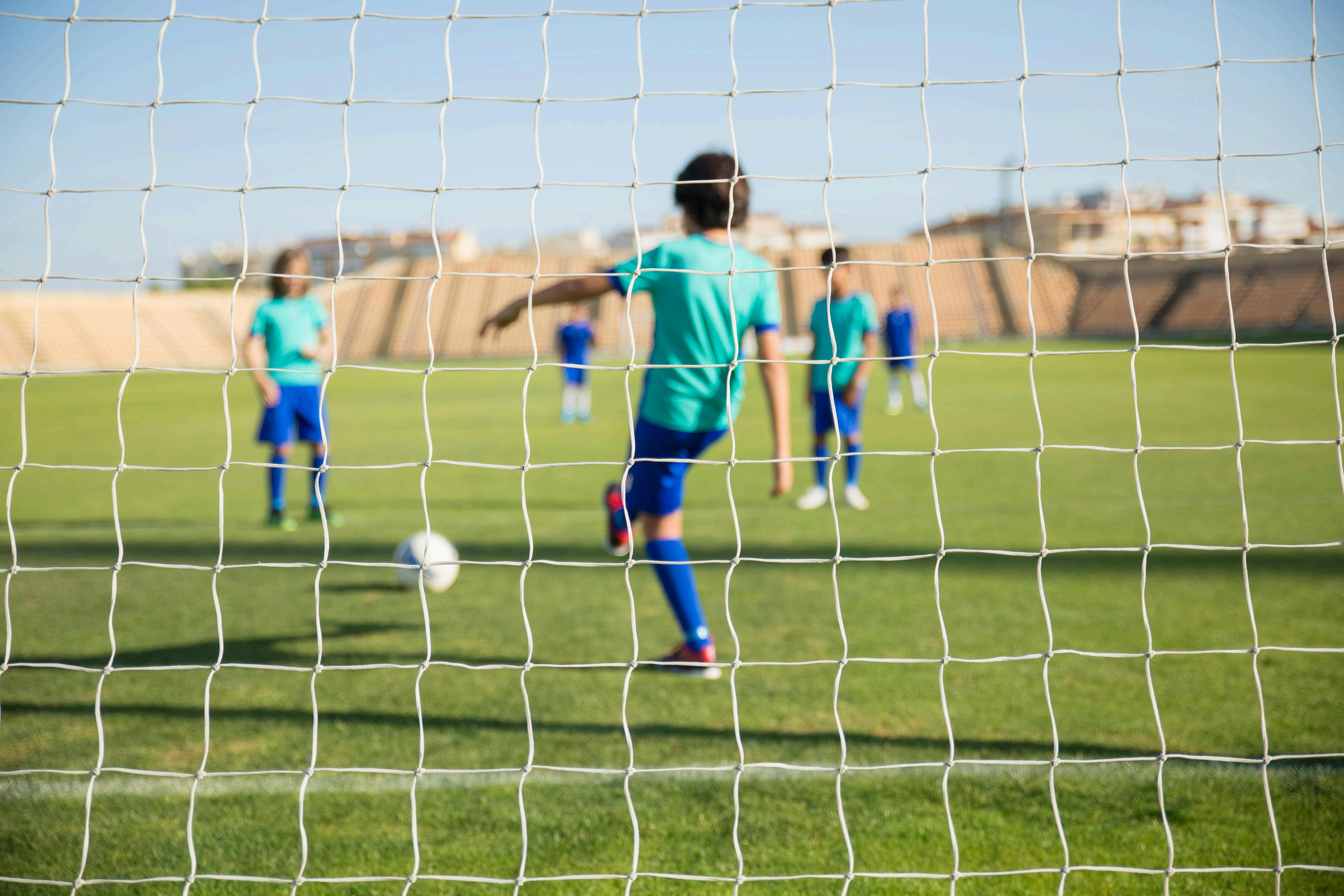

In the spring term of 2025, Year 1 students will concentrate on games and gymnastics during their PE lessons.
They will build upon their foundational skills in netball and football while also being introduced to new games such as bench ball and dodgeball, which share similar core competencies. The focus will be on enhancing their teamwork abilities and strategic thinking in competitive team settings, as well as familiarizing themselves with additional game rules.
In gymnastics, students will investigate spatial awareness and learn to navigate their environment using various body parts. They will practice forming basic body shapes, executing balances, jumps, and rolls with the aid of simple equipment and mats. Ultimately, they will combine these movements into a cohesive gymnastics sequence.
At Hampton Court House, structured physical activity plays a crucial role in the holistic development of children, encompassing physical strength, cognitive growth, motivation, and social skills.
Autumn
Spring
Summer
What are we studying?
Football: passing, shooting, dribbling, conditioned games.
Netball: passing, shooting, attack vs defence, positions and conditioned games.
Gymnastics: balances, body shapes, travel, jumps and rolls
Games: balance, coordination, agility, throwing and catching.
Cricket: throwing, catching, batting, bowling and fielding.
Athletics: sack race, long jump, javelin throw, obstacle race, relay, 60m sprint.


In music, Year 1 students will learn about music from the British Isles. They will listen and appraise, sing and create music connected to the British landscape and folk history.
In ballet, the students will follow the Royal Academy of Dance syllabus using this to help them develop their technique, musicality and performance. In drama, the students will prepare a performance of ‘The Happy Prince’ in French as part of a school production.
Throughout the year, there will also be numerous recitals and concerts, providing students with platforms to display their musical abilities and talent.
At Hampton Court House, we believe that the performing arts are integral to our school community. Therefore, students will actively participate in various performances throughout the year. These performances form the backbone of our curriculum. We are committed to offering inclusive opportunities that allow every student to showcase their talents.
To prepare for these performances students will focus on developing spatial awareness, musicality, vocal, physical, and character skills to enhance their performance abilities. They will learn stage craft and understand how to engage an audience.
Additionally, we place a strong emphasis on collaborative and creative skills, which are essential for every child's growth. Our classes incorporate engaging games and activities designed to foster teamwork, improve peer interaction, and develop the ability to follow directions. Students are encouraged to contribute creative suggestions through music, movement, and dialogue, ensuring a well-rounded arts education at Hampton Court House.
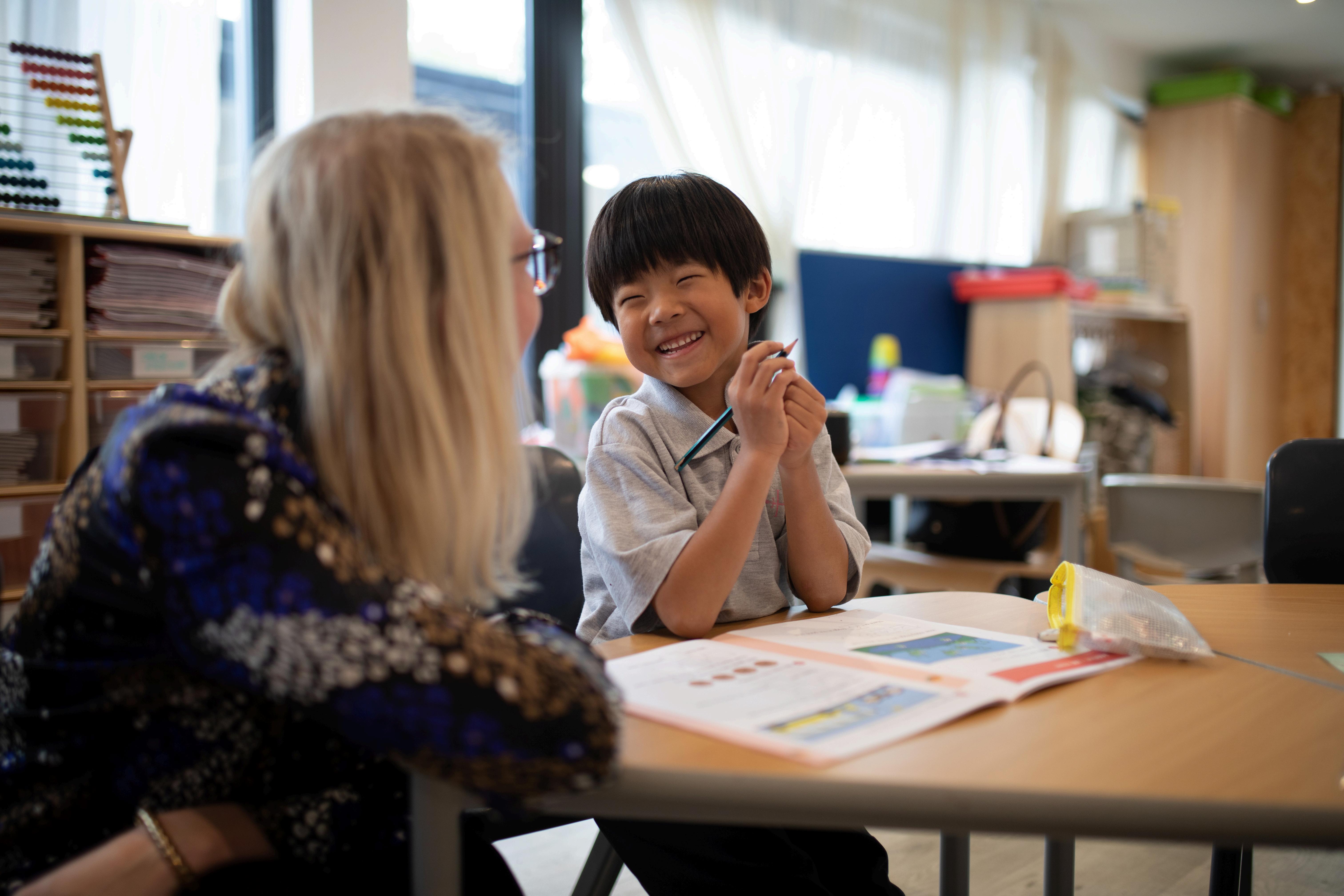

Year 1 Curriculum Overview Spring Term 2025
This term we are moving on to our ‘Relationships’ and ‘Changing Me’ topics. We will begin by thinking about our families, and different types of families. We will then explore what being a good friend means, and appropriate ways of physical contact with friends, thinking about what the children as individuals would prefer. We will explore qualities of a good friend and who children can go to for support. In the second half of the term, we move on to ‘Changing Me’. This includes looking at life cycles of humans and animals, then identifying how the children have changed since being babies. They look at the differences between girls’ and boys’ bodies and finish the term thinking about changes in their life they may face and the feelings they might experience.
Please do remember that parents can request any topics or lesson resources at any time.
We aim to make all PSHE sessions as relevant to the students and their current needs and concerns, therefore out content is changeable, and suggestions and feedback are welcome at any time from students and parents.
How it will be assessed
PSHE lessons are predominantly discussion based, with some written tasks for deeper comprehension and application. At the end of each lesson, the students will complete self-reflection sheets for teachers to monitor understanding and adapt future teaching. Teachers keep track of the students’ levels and understanding of the different elements of PSHE across the year.
What are we studying?
Being Me in my World
Feeling special and safe My class
Autumn 1
Autumn 2
Rights and responsibilities
Rewards and feeling proud Consequences
Relationships
Families Making friends
Spring 1
Summer 1
Greetings People who help us Being my own best friend
Healthy Me
Being healthy
Healthy choices
Clean and healthy
Medicine safety Road safety
Spring 2
What are we studying?
Celebrating Difference
Similarities and differences
What is bullying?
What do I do about bullying? Making new friends
Changing Me
Life cycles
My changing body
Boys’ and girls’ bodies
Coping with changes
Dreams and Goals
Steps to goals
Summer 2
Achieving together
Having a positive attitude
Overcoming obstacles
